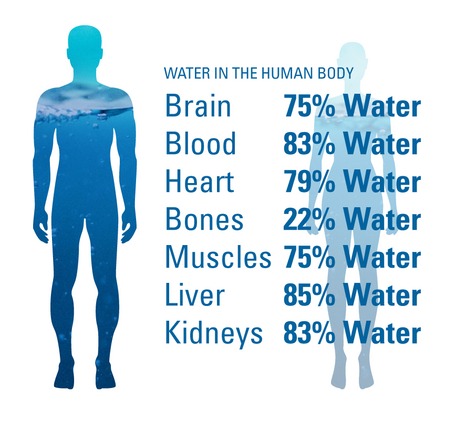Have you ever wondered why water is so important to your body? Water makes up for most of the damage that happens due to day to day activities like walking, exercising, running or even doing something as simple as sitting in the sun. Water includes essential electrolytes like potassium, magnesium, calcium and various other nutrients. It is essential for all absorption and digestion purposes. Water acts as a coolant in the body, assisting in temperature regulation during exercise, fever, and in hot environments. Water also acts as a lubricant between joints, in the spinal cord, and in the brain. Water is required for nearly all of your body's major systems to function and survive. With water accounting for roughly 60% of your body weight, it's no surprise that staying hydrated can help you. The body organs with highest water percentage are Brain (80-85%), Lungs (75-85%), Kidney (80-85%), Eyes (95%), Blood (94%), and Muscles (70-75%). Different organs in the human body have different percentages of water due to their distinct functions. Because two-thirds of total body water is contained inside cells, organs that are large and highly cellular contain a higher percentage of total body water.
Are you curious to know what role water plays for all these organs? Let’s find out:
• Water is the fundamental building block of cells.
• It serves as an insulator, regulating body temperature. This is partly because water has a high specific heat, plus the body uses perspiration and respiration to regulate temperature.
• Water insulates the brain, spinal cord, organs, and fetus. It acts as a shock absorber.
• Water carries oxygen and nutrients to cells
It is vital to drink enough water to support all bodily functions. Most people get enough fluids throughout the day from food and beverages. In hot weather or after exercise, they should drink more fluids.
Therefore some tips for adults include:
• Not delaying drinking fluids until thirsty
• When taking medication, drink a full glass of water.
• drinking a glass of water before and after exercise
Water makes up the vast majority of the human body. The percentage varies depending on age, gender, and body type, but it is usually around 60%. A person can keep the water balance in their body by drinking enough fluids throughout the day.
Know about water composition of our bodies


